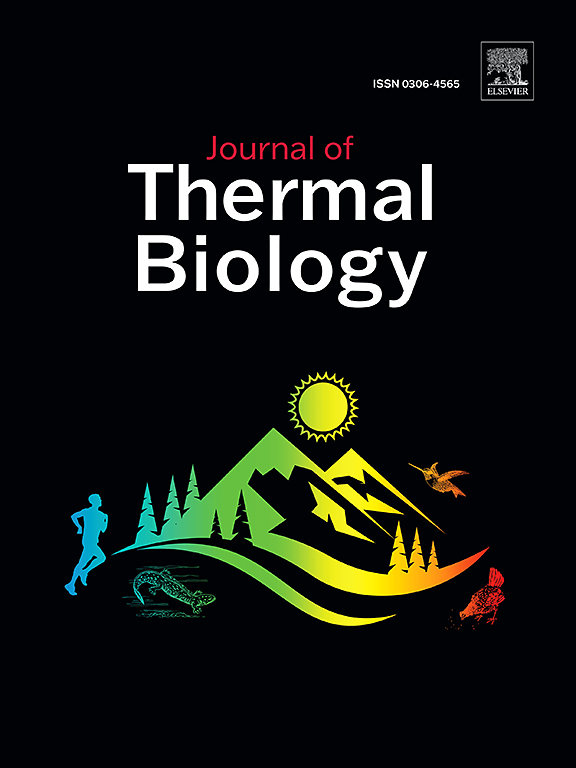Searching for variables representing the response to cold stress in mediterranean Geotrupinae reveals an association between heat and cold tolerances
IF 2.9
2区 生物学
Q2 BIOLOGY
引用次数: 0
Abstract
The study of cold tolerance is imperative for understanding insect activity across spatial and temporal gradients. Here, we assessed various physiological variables to discern the response to cold stress in Mediterranean earth-boring dung beetles, utilizing an infrared thermography protocol initially developed for detecting heat stress variables.
Subsequently, we conducted a joint analysis of heat and cold stress variables to explore the extent of congruence between their responses. Our findings indicate that the temperatures at which activity ceases and resumes are the most effective variables for distinguishing between the cold thermal strategies of the studied species. Moreover, our analyses revealed a positive association between the variables representing heat and cold tolerances, wherein species with higher upper limits of heat tolerance also exhibit higher temperatures at which they become immobilized by cold.
This result suggest that adaptations to endure heat may compromise resistance to cold in these insects. We hypothesize about the main factors (loss of wings, fusion of the elytra, and accumulation of haemolymph) that could have represented radical modifications in the Mediterranean clades of Geotrupinae. These factors may have reshaped their life history and thermal physiology, potentially impairing thermogenesis, reducing cold hardiness and freezing resistance.
在地中海地区的 Geotrupinae 中寻找代表对冷应激反应的变量,发现耐热性和耐寒性之间存在联系。
研究耐寒性对于了解昆虫的跨时空梯度活动至关重要。在这里,我们利用最初为检测热应激变量而开发的红外热成像方案,评估了地中海掘土蜣螂的各种生理变量,以确定其对冷应激的反应。随后,我们对热应激和冷应激变量进行了联合分析,以探索它们的反应之间的一致程度。我们的研究结果表明,活动停止和恢复时的温度是区分所研究物种冷热策略的最有效变量。此外,我们的分析表明,耐热性和耐寒性变量之间存在正相关,耐热性上限较高的物种也表现出较高的耐寒温度。这一结果表明,这些昆虫对耐热的适应性可能会削弱对寒冷的抵抗力。我们假设了可能代表地中海地鳖亚科发生根本性变化的主要因素(翅的缺失、背甲的融合和血淋巴的积累)。这些因素可能重塑了它们的生活史和热生理学,可能会损害产热,降低耐寒性和抗冻性。
本文章由计算机程序翻译,如有差异,请以英文原文为准。
求助全文
约1分钟内获得全文
求助全文
来源期刊

Journal of thermal biology
生物-动物学
CiteScore
5.30
自引率
7.40%
发文量
196
审稿时长
14.5 weeks
期刊介绍:
The Journal of Thermal Biology publishes articles that advance our knowledge on the ways and mechanisms through which temperature affects man and animals. This includes studies of their responses to these effects and on the ecological consequences. Directly relevant to this theme are:
• The mechanisms of thermal limitation, heat and cold injury, and the resistance of organisms to extremes of temperature
• The mechanisms involved in acclimation, acclimatization and evolutionary adaptation to temperature
• Mechanisms underlying the patterns of hibernation, torpor, dormancy, aestivation and diapause
• Effects of temperature on reproduction and development, growth, ageing and life-span
• Studies on modelling heat transfer between organisms and their environment
• The contributions of temperature to effects of climate change on animal species and man
• Studies of conservation biology and physiology related to temperature
• Behavioural and physiological regulation of body temperature including its pathophysiology and fever
• Medical applications of hypo- and hyperthermia
Article types:
• Original articles
• Review articles
 求助内容:
求助内容: 应助结果提醒方式:
应助结果提醒方式:


